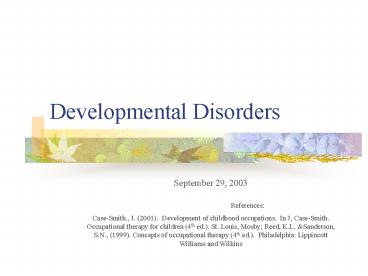Developmental Disorders - PowerPoint PPT Presentation
1 / 8
Title:
Developmental Disorders
Description:
Concepts of occupational therapy (4th ed. ... Down Syndrome. Pre-maturity. Genetic Syndromes (Trisomy 13, Prader Willi) Autism. Developmental Delay ... – PowerPoint PPT presentation
Number of Views:383
Avg rating:3.0/5.0
Title: Developmental Disorders
1
Developmental Disorders
- September 29, 2003
- References
- Case-Smith., J. (2001). Development of childhood
occupations. In J, Case-Smith. Occupational
therapy for children (4th ed.). St. Louis, Mosby
Reed, K.L. Sanderson, S.N., (1999). Concepts of
occupational therapy (4th ed.). Philadelphia
Lippincott Williams and Wilkins
2
What does this include?
- A few diagnoses included under developmental
disorders - Cerebral Palsy
- Spina Bifida
- Down Syndrome
- Pre-maturity
- Genetic Syndromes (Trisomy 13, Prader Willi)
- Autism
- Developmental Delay
3
Childhood occupations and environments
- Play
- School
- Family
- Friends
- Community
4
Frame of reference- Developmental (Llorens)
- Looks at the child in progressive stages (earlier
to later) - Movement is organized from head to feet and from
proximal to distal - Very useful to know normal development before you
can identify abnormal - A disadvantage of the developmental framework
what happens when the client reaches 21 years of
age??
5
Ecology of Human Performance(Dunn)
- Looks at the relationship of Person-Task and
Context (Environment) and their relationship to
human performance.
6
Assessments
- Developmental Assessments
- Peabody Developmental Motor Scales
- Bayley Scales of Infant Development
- Learning Accomplishment Profile
- Hawaii Early Learning Profile
- Occupational Assessments
- Pediatric Evaluation of Disability Inventory
- School Function Assessment
- Canadian Occupational Performance Measure
7
Practice Framework as a Guide
- Performance Areas to evaluate
- ADLs
- IADLs
- Education
- Work
- Play
- Leisure
- Social Participation
- Performance Skills for evaluation
- Motor skills (gross, fine, muscle tone)
- Cognitive skills
- Social skills
8
Evaluation Continued
- Performance Patterns
- What habits have been interrupted?
- Routines?
- Roles?
- habits- automatic behavior that is integrated
into more complex patterns that enable people to
function on day-to-day basis - routines-occupations with established sequences
- roles- a set of behaviors that have some
socially agreed upon function and for which there
is an accepted code of norms
- Context
- Cultural
- Physical
- Social
- Personal
- Spiritual
- Temporal
- Virtual (may/may not apply all the time)































